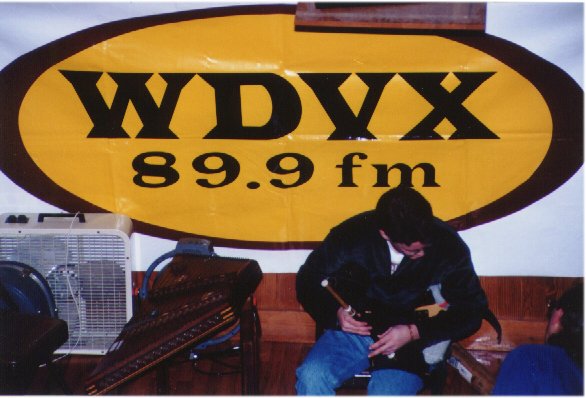UILLEANN PIPER MATT McNEELY
an interview by Charlie Ball

Matt playing pipes at the WDVX benefit

CB: How did you first decide to play the uilleann pipes?
MM: I guess you are attracted to a particular instrument in the beginning, be it a fiddle, flute, pipes, or what have you. I saw Phil Sexton playing pipes up at the Grandfather Mountain Highland Games in Linville, North Carolina. This was my first face to fact meeting with these things, and honestly, I didn't know what of think of them. That was where my interest in the uilleann pipes began. Thank you, Phil.
CB: Just what are the uilleann pipes, and how do they differ from the highland bagpipe?
MM: The uilleann pipes are the traditional Irish bagpipe. They differ from the highlands in a few respects. Firstly, they are bellows blown. The Scottish bagpipe is mouth blown via a blowstick. The uilleann chanter has a larger scale than the highland chanter (two full octaves) and can be played in either an opened or stopped setting. The Irish pipes are also played sitting down.
CB: Are there more opportunities for phrasing and articulation on the uilleann pipes than on the highland pipes?
MM: Highland pipers utilize a very traditional repertoire of ornamentation, which is learned over a period of time. Most of the time, highland pipers don't stray from the way a tune is traditionally played. The uilleann pipes, however, not coming from a strict military background, are open to more individualized interpretation. Everyone has their own way of playing rolls, crans, and all the other unique techniques that make the uilleann pipes so much fun.
CB: You told us that seeing Phil play the pipes got you interested in the instrument. How did you first get interested in Irish music in general?
MM: Again, I would have to mention trips to Grandfather Mountain as being my springboard. I saw a band called Clan Na Gail (now Seven Nations) plays up there, and Neil Anderson was playing uilleann pipes and whistles with them. Also, you have traditional musicians (Phil and Craig Sexton, and Terry Schomer just to mane a few) playing around the campfire every night which was great exposure.
CB: How does a person learn to play the uilleann pipes? Is it hard to do?
MM: To quote a friend of mine, "Never get one of those damned tin whistles because they lead to harder drugs!" Anyway, you usually learn the whistle first, and the pipes follow a few years after that. But you always start by just listening to the music and learning about the tradition. You learn to identify distinct styles with certain players. For example, Paddy Keenan and Davy Spillane are very aggressive "open style" players who borrow heavily form Johnny Doran, the open-style master. This "open-style" is what really pleases my ear. Then you also have the less aggressive, but technically brilliant players such as Seamus Ennis and Liam O'Flynn.
CB: Would you say that Liam O'Flynn uses more of the tight fingering than the others you mentioned?
MM: Yes. It is a very difficult style of piping. As I mentioned before, the "open" or "northern" style of playing is what really captivates me. The Bothy Band was and is my primary influence and Paddy Keenan was, of course, their driving force. Then I found out about his solo recordings!
CB: Donal Lunny called Paddy Keenan "The Jimi Hendrix of the pipes." What are you doing now in Irish music, and where do you hope to go from here?
MM: Well, right now, I'm practicing a lot. I'm constantly working on and expanding my repertoire. As far as the pipes go, I'm about to add the drones to my practice set. I've been playing on the practice set which consists of bag, bellows, and chanter for almost a year now.
CB: What are regulators?
MM: A major pain from what I hear.
CB: I've known some pipers who've needed regulation, but I don't think that's what we're talking about.
MM: The regulators are keyed drones that are used for providing chordal accompaniment to embellish a melody.
CB: What do you hope to do in the future with all this?
MM: I have a band now with Evan Carawan, Mark Warford, and Jason Herrera. As far as the future goes, it's wide open. I'm going to keep playing and see where it takes me.
CB: What do you think of the Irish music scene in Knoxville?
MM: I think that we're truly blessed here in Knoxville with some wonderful players and people. The scene is constantly growing and improving. We're experiencing an explosion of interest and participation right now. It's going very well. People are always joining us from out of town for our Thursday night session at Patrick Sullivan's Saloon which is the new hub of Irish music in Knoxville.
CB: Well, good luck to you, and keep piping.